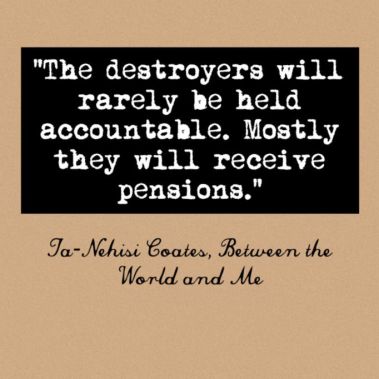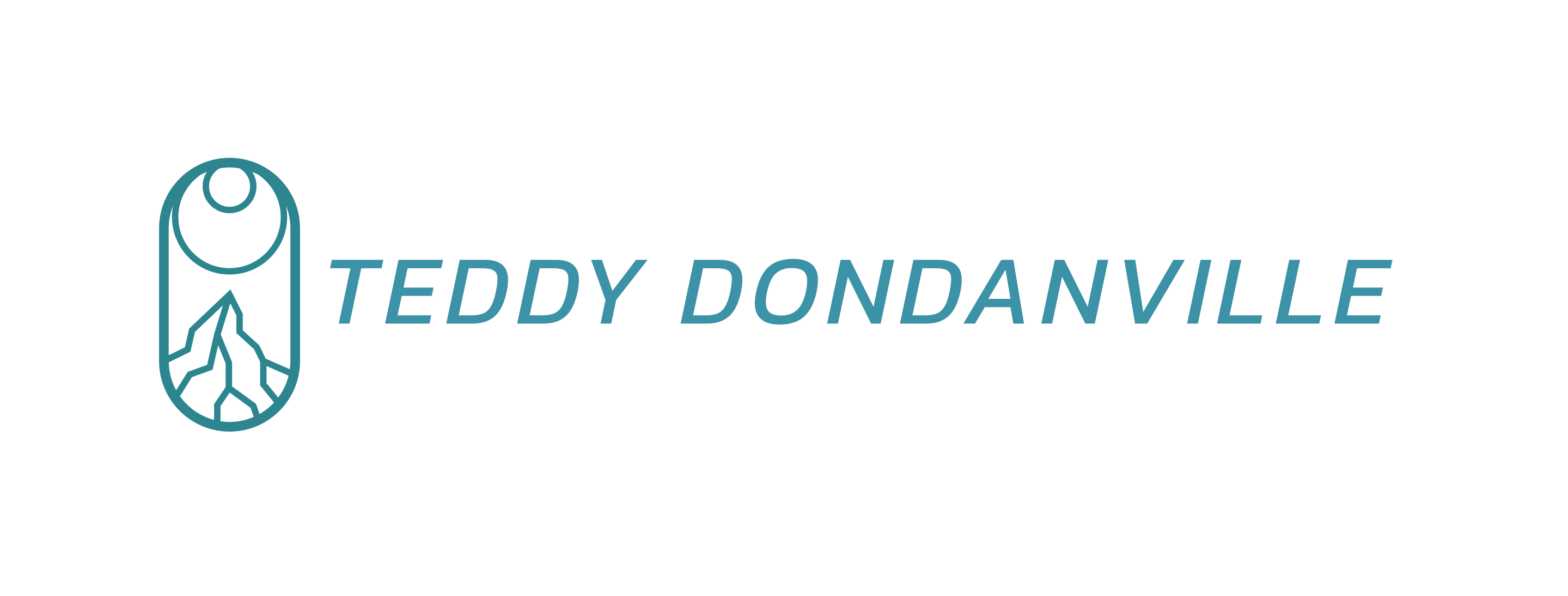Teddy Dondanville
Rock Climbing Guide & Freelance Writer
Los Lunes Son Para Libros, 7th Edition

For this week’s edition of Los Lunes Son Para Libros, I am going to talk about a book called Between the World and Me written by Te-Nehisi Coates. It is a short book and an extremely fast read. In total it took my two days to finish. Coates’ writing style contributes to the fact that you are able to fly through the pages. The book is like one long poem. Actually, it’s more like a mix of prose and poetry. Coates blends to the two styles of writing in order to create a narrative that is incredibly entertaining. With a background in journalism and poetry, Coates’ writing is entirely vivid and consuming. Each word of every sentence packs a punch and accomplishes a goal. Coates’s ability to story tell is what makes this book so special. In general, the book is a letter to his teenage son. However the way he writes it makes it sound like a terrifyingly beautiful, heartbreakingly uplifting story (warning) to his son.

Between the lines and underneath the imagery, Coates provides a chilling social commentary on the state of race relations in the United States. With that said, Coates also has no fear calling it how it is. He has no problem ripping the veil away from the politics, events and daily affairs of his characters in order to expose the barbaric ugliness that stains much of what some people think is beautiful about the United States. If you are sensitive to critical racial and/or ethnic conversations, or do not resonate with the social facts of white privilege and/or institutional racism, normally I would say that I do not recommend this book to you. But on second thought, if that’s where you stand with respect to race relations in the United States, then maybe this book will do some good.
The lack of structure in Between the World and Me has got me struggling with how to talk about it. The book is split into three numeric sections. Between the chapters, Coates flows from one topic to the next and from one anecdote to the other. I had trouble deciphering what he was trying to accomplish with the way he divided his book. The book is ambiguous in that way. However, the words Coates uses, the structure he employs and the vivid imagery he creates are all crystal clear. With that as some ground to stand on, I’ll choose a few of my favorite lines from the book (there are a lot) and use them to spur thought processes and social commentary.
“But race is the child of racism, not the father. And the process of naming “the people” has never been a matter of genealogy and physiognomy as much as one of hierarchy”
Okay, short commentary here… race is not a biological/essential/evolutionary/scientific concept. It is SOCIAL. What does this mean? It means that the genes inside me, the things that give me phenotypical differences from another person, cannot and should not be attributed to race (or ethnicity). The racial and ethnic boundaries human populations have drawn around people are as imaginary as the ones we draw around countries. Not to mention the fact that both these processes were originally created by white and privileged male ‘scientists’. They are social/made up/cultural/ contextual. They change from place to place and from decade to decade. Race is different than what it was in the past and what it will be in the future. What probably will not change however, is the social fact that race gets used to socially construct social hierarchies of humans.
“To be black in the Baltimore of my youth was to be naked before the elements of the world, before all the guns, fists, knives, crack, rape, and disease. The nakedness is not an error, nor pathology. The nakedness is the correct and intended result of policy, the predictable upshot of people forced for centuries to live under fear”
Okay so here’s what I mean by potent imagery. If these few lines don’t evoke some sort of emotion– curiosity, sadness, frustration, resentment, confusion– then check your right supramarginal gyrus. Coates blends poetic and journalistic imagery to enhance a social critique, which in this case, is institutional racism. I would like to mention a few things here without going on too long about this incredibly dense topic. The institutional racism that Coates is referencing here is a direct result of the slave trade in the United States. Imagine being held back, beaten and locked up for 100s of years. Meanwhile, the country is developing. Laws are being written, social norms and values are being legitimized, children are being socialized etc. All of this happening without the equitable presence of African Americans (or any other diversity for that matter). Now imagine gaining freedom and joining that society. A society that was built from your labor. And if you came later, a society built on the backs of your ancestors. A society that never once took you into consideration when it was designing its structure, processes and institutions. How is one supposed to join that world at the same pace as everyone else? They’re not. And how are we supposed to rebuild that world to consider the decades of marginalization? Slowly. Really goddamn slowly. At least for as long or longer than what it took to create it, because after all, African Americans have been enslaved in our country longer than they have been free.

“The Dream thrives on generalization, on limiting the number of possible questions, on privileging immediate answers. The Dream is the enemy of all art, courageous thinking, and honest writing”
Coates writes about the concept of “the Dream” in his book frequently. Personally, I think it’s one of the most ingenious parts of the text. The Dream that Coates is writing about is the American Dream. But what’s so stunning about how he uses it is that his perspective come from the backside of the Dream. According to Coates, the Dream wasn’t designed for him, his son or people like them. In other words, there is a flip-side to any social phenomena. White privilege/alienation of diversity. Male privilege/delegitimized presence of women. Nationalism/xenophobic hatred. The list goes on. Coates’ commentary on the Dream is powerful for me because it’s the Dream I’ve been turning into reality my entire life. Loving home, good education, worldy travels, opportunity, privilege etc. And what did I do to deserve it? Nothing. I got lucky to get placed into it. And what did Coates do to deserve the flip-side? Nothing. He got thrown into it. If its all just luck, why do we place so much value–value derived from the persecution of others– into the Dream? I don’t have the answer, but I’m working to stay grateful and with my eyes open.
“In my small apartment, she kissed me, and the ground opened up, swallowed me, buried me right there in that moment”
Coates doesn’t only touch on topics of race, but also of love and intimacy. Coates is definitely a lover. A devoted father and spouse. This quote is from when he was talking about a girl he fell in love with. I just think its really beautiful. The cliche of ‘falling in love’ has never been so clear to me before I read this sentence. If you love someone, tell them!
“Everything that was the past seemed to be another life. There was before you, and then there was after, and in this after, you were the God I’d never had. I submitted before your needs, and I knew then that I must survive for something more than survival’s sake. I must survive for you”
Here we are again with Coates’ ability to express his intimate emotions and love in an incredibly powerful way. In this quote he is talking about his son while also talking directly to him. When I read this I think immediately of my parents. And if they were poets or journalists, that they might describe their love for me in this way. But they aren’t and thats okay. They express this much love and commitment in other ways and I am grateful. Coates’ writing about being a father makes me want a kid, which if you know me, is something I’ve been contrary to. My thoughts are that there are enough kids in this world that need life and that I should adopt rather than create more. But damn, Coates has got me thinking otherwise.

“Think of all the love poured into him. Think of the tuitions for Montessori and music lessons. Think of the gasoline expended, the treads worn carting him to football games, basketball tournaments, and Little League. Think of the time spent regulating sleepovers. Think of the surprise birthday parties, the daycare, and the reference checks on babysitters. Think of World Book and Childcraft. Think of checks written for family photos. Think of credit cards charged for vacations. Think of soccer balls, science kits, chemistry sets, racetracks, and model trains. Think of all the embraces, all the private jokes, customs, greetings, names, dreams, all the shared knowledge and capacity of a black family injected into that vessel of flesh and bone. And think of how that vessel was taken, shattered on the concrete, and all its holy contents, all that had gone into him, sent flowing back to the earth”
I really love this portion of Coates’ book. In it, he is talking about a friend of his named Prince Jones. Prince was unarmed when he was shot 8 times and killed by an undercover narcotics officer in September 2000. To read more, click here. What I love so much about these lines are their ability to conjure just how much value is placed into a human life. I see myself in these sentences. I see the lost lives of my friends in these lines. The love, energy, time, money, commitment. We are nothing without the care of our families and friends. Coates’ ability to depict and pay homage to the consumptive process of raising human children with only his words is really impressive.
“Our moment is too brief. Our bodies are too precious”
Coates spends a lot of time in his book contemplating the fleeting quality of the human life. This is a result of his up brining. One that was fraught with threats to human life– to his life and to the lives of his friends and neighbours. For Coates, it boils down to the body. Controlling bodies, taking bodies, breaking bodies, segregating bodies, killing bodies. Coates strips the symbolism from the human body and from the human condition, I think, because he is an atheist. He references multiple times in his book about how he is godless. For Coates, all the value, symbolism and power we have as humans is built into the one body, the one vessel, we receive when we come into consciousness. For Coates, there is no afterlife, there is no spirit. I personally don’t know where I stand on this, but I admire Coates ability to be so brave and clear about his beliefs.
“Once, the Dream’s parameters were caged by technology and by the limits of horsepower and wind. But the Dreamers have improved themselves, and the damming of seas for voltage, the extraction of coal, the transmuting of oil into food, have enabled an expansion in plunder with no precedent. And this revolution has freed the Dreamers to plunder not just the bodies of humans but the body of the Earth itself. The Earth is not our creation. It has no resect for us. It has no use for us. And its vengeance is not the fire in the cities but the fire in the sky. Something more fierce than Marcus Garvey is riding on the whirlwind. Something more awful than all our African ancestors is rising with the seas. The two phenomena are known to each other. It was the cotton that passed through our chained hands that inaugurated this age. It is the flight from us that sent them sprawling into the subdivided woods. And the methods of transport through these new subdivisions, across the sprawl, is the automobile, the noose around the neck of the earth, and ultimately, the Dreamers themselves”
This quote comes towards the end of Between the World and Me. It is incredibly well said and strategically placed. Coates subsumes, with these incredibly vivid sentences, a critique of not only essentialist perspectives of race but also of the capitalist economic modes of production. Coates shines an environmentalist light in this paragraph and combines it nicely with a nuanced Marxist perspective. Nuanced not in the sense that his ideas are new, but nuanced in the way that he writes about the contradictory nature of capitalism itself and its exponentially increasing negative impacts on the limits and resources of our earth. The transition from human and horsepower to organic and jurassic sources of fossil fuels came with the industrial revolution. With the cities dirtied and suffocating from this new production, white flight and suburbinization took place rapidly. The private and public sphere, the black and white segregation and the urban and suburban division was more clear than ever. Connecting the two and making it possible was and is private transportation. The privileged ability to move oneself from one place to the next is often overlooked. Not only for its environmental impacts, but also for its socio-cultural underpinnings. Freedom and mobility become intertwined with race,economic privilege and capitalist work ethics. This no doubt is a doom for our planet. A doom only exacerbated by our indiscriminate carnivorous diets, a dairy dependence, gluttonous and toxic agricultural practices and fetishes for the next best thing. There is a lot of bad that is hurting our world. But there is also a lot of beauty to be found in the silver lining. Books like Between the World and Me and humans like Te-Nehisi Coates are just two examples. On what side of the fence do you find yourself?




Book sounds great!
But REALLY enjoyed the article on supramarginal gyrus. Can you send me any other relevant articles on the subject if you have any? Thanks bud! Much love!
Thanks for reading. I don’t have anything else related to that. I literally googled “part of the brain responsible for empathy” to put that blurb in there. But sounds like you should read me evolutionary psychology and psychology in general!